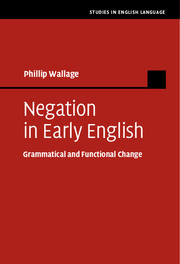Book contents
- Frontmatter
- Dedication
- Contents
- List of figures
- List of tables
- Acknowledgements
- Abbreviations
- 1 Introduction
- 2 Quantitative Evidence for a Model of the Jespersen Cycle in Middle English
- 3 Distributional Evidence for Two Types of ne: Redundant Negation
- 4 Distributional Evidence for Different Types of not
- 5 The Syntax of the Early English Jespersen Cycle: A Morphosyntactic Feature-based Account
- 6 The Role of Functional Change in the Jespersen Cycle
- 7 Negative Concord in Early English
- 8 Negative Inversion: Evidence for a Quantifier Cycle in Early English
- 9 The Loss of Negative Concord: Interaction Between the Quantifier Cycle and the Jespersen Cycle
- 10 Conclusion
- References
- Index of names
- Index of subjects
1 - Introduction
Published online by Cambridge University Press: 13 July 2017
- Frontmatter
- Dedication
- Contents
- List of figures
- List of tables
- Acknowledgements
- Abbreviations
- 1 Introduction
- 2 Quantitative Evidence for a Model of the Jespersen Cycle in Middle English
- 3 Distributional Evidence for Two Types of ne: Redundant Negation
- 4 Distributional Evidence for Different Types of not
- 5 The Syntax of the Early English Jespersen Cycle: A Morphosyntactic Feature-based Account
- 6 The Role of Functional Change in the Jespersen Cycle
- 7 Negative Concord in Early English
- 8 Negative Inversion: Evidence for a Quantifier Cycle in Early English
- 9 The Loss of Negative Concord: Interaction Between the Quantifier Cycle and the Jespersen Cycle
- 10 Conclusion
- References
- Index of names
- Index of subjects
Summary
The Jespersen Cycle and Theories of Syntactic Change
The Jespersen Cycle
The Jespersen Cycle (Jespersen, 1917) has long been regarded as a textbook case of grammaticalisation, found in many languages. The English Jespersen Cycle manifests itself as a sequence of overlapping stages, each formally distinct from the preceding one as in (1)–(3).
(1) Stage One: Sentential negation is marked by ne alone (c.1150–1300)
a. we ne moten halden Moses e lichamlice
we NEG might observe Moses’ law bodily
‘we might not observe Moses law literally’
(CMLAMBX1,89.735)
b. we ne mugen þat don
we NEG can that do
‘We cannot do that’
(CMTRINIT,103.1370)
(2) Stage Two: The sentential negator not co-occurs with ne. Sentential negation comprises two parts (c. 1150–1400)
a. ac of hem ne speke ic noht
but of them NEG spoke I not
‘but I did not speak of them’
(CMTRINIT,95.1272)
b. I ne may nat denye it
I NEG may not deny it
‘I may not deny it’
(CMBOETH,435.C1.262)
(3) Stage Three: Sentential negation is marked by not alone. (c.1350– 1500)
a. Thou shalt not do so
You ought not do so
‘You ought not do so’
(CMROLLTR,41.855)
b. I know nat the cause
I know not the cause
‘I do not know the cause’
(CMMALORY,627.3549)
The changes result in the grammaticalisation of not as a marker of sentential scope negation, and take place during a period from the ninth century to the? fteenth century. What changes constitute the Jespersen Cycle?
- Type
- Chapter
- Information
- Negation in Early EnglishGrammatical and Functional Change, pp. 1 - 10Publisher: Cambridge University PressPrint publication year: 2017



